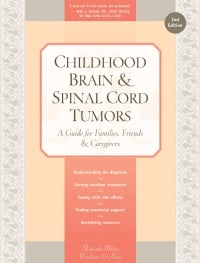Childhood Brain and Spinal Cord Tumors
Making a decision
As soon as possible after diagnosis, parents sit down with the medical team to discuss treatment options. If your child is being treated at a research hospital, the first discussion is usually about standard treatment and a clinical trial, if a trial is open and your child qualifies. Parents are often very conflicted about choosing a treatment.
We did a study and my son received 1.8 Gy, with a boost to the entire posterior fossa. I have struggled with lots of guilt over the decision. We were thrown into such a whirlwind and decisions had to be made so quickly. My husband and I debated and debated, prayed and prayed, and then when we decided to go ahead with the study, we both agreed to no regrets. But, it did feel as if we were playing Russian roulette with our child.
The choice to opt for standard treatment or a clinical trial is a strictly personal one, but parents should only make it after they are certain they understand the implications of each path. The doctor is legally and ethically bound to alert parents to the full range of medically appropriate treatment options available to their child and to help the parents understand what each option entails before asking them for written consent (and older children and teens to provide assent) to begin a particular treatment plan. The doctor may recommend a particular treatment option that he believes to be in the best interest of the child, but he may not coerce or deceive the parents into approving a treatment. Once the parents have consented to standard treatment or a clinical trial, the doctor is obligated to abide by their decision.
Table of Contents
All Guides- Introduction
- 1. Diagnosis
- 2. The Brain and Spinal Cord
- 3. Types of Tumors
- 4. Telling Your Child and Others
- 5. Choosing a Treatment
- 6. Coping with Procedures
- 7. Forming a Partnership with the Treatment Team
- 8. Hospitalization
- 9. Venous Catheters
- 10. Surgery
- 11. Chemotherapy
- 12. Common Side Effects of Chemotherapy
- 13. Radiation Therapy
- 14. Peripheral Blood Stem Cell Transplantation
- 15. Siblings
- 16. Family and Friends
- 17. Communication and Behavior
- 18. School
- 19. Sources of Support
- 20. Nutrition
- 21. Medical and Financial Record-keeping
- 22. End of Treatment and Beyond
- 23. Recurrence
- 24. Death and Bereavement
- 25. Looking Forward
- Appendix A. Blood Tests and What They Mean
- Appendix C. Books and Websites

